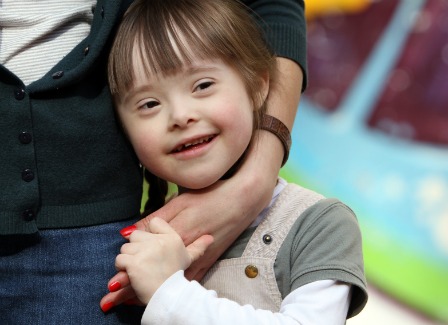
Advocating for a child with special needs often means working to ensure the child is accepted and not treated any differently than typically developing kids. Right? Well, not always. A portion of parents demand special treatment when it suits their needs.
then they want
special treatment
Who’s right? Who’s wrong?
When I asked a forum of parents who have children with Down syndrome whether they’d ever “played the Down syndrome card,” I expected crickets. I thought people wouldn’t admit to it.
Not only was I wrong, I uncovered an underground parenting system of justifying a list of children's missteps and moments of downright misbehavior.
According to parents who bravely responded honestly to my questions, the act of seeking preferential treatment often falls into three categories:
- What feels right
- What feels wrong
- What feels like it would leap-frog lines at Disney World
What feels right
“I have witnessed it,” Jenn says. “It annoys me till no end. I don't give [my son] a pass because of his Down syndrome the same way I don't give [my daughter] a pass because blondes have more fun and she's a brunette.”
“In my book, it's totally OK [to expect special treatment] when there are thousands of dollars worth of damage,” Jenn says with a smile and a wink. “And I still lie and tell restaurants [my daughter] is 3 if [that means] she eats free.”
Jill has a toddler with Ds and flinched the first time she heard another mother mention leveraging her child’s disability to get special treatment at Disney World.
“My gut reaction was that it was wrong,” she describes, “but then several parents have put it to me that children with Ds go through so much more than other kids. For one day or one week, if they could breeze through the lines — wouldn’t it be nice? I can wrap my head around that… I can see once in a blue moon, everybody wants it a little easier.”
What feels wrong
“I'm ashamed, but yes. I've done it,” Lucy admits. Over the holidays, her family stayed at a rented cabin. With five children between ages 4 and 8 years, the family opted for insurance.
and he's 2!"
“[My son, who has Down syndrome] got a hold of a dry erase marker and proceeded to color all over himself, the furniture and a wall in the kids' room," Lucy describes.
“While attempting to explain to the rental company, we may have mentioned that the guilty child has a disability,” she shares.
“We were let off the hook.”
What about when others offer parents the Down syndrome card — a moment where the parent hadn't considered looking for special treatment because of her child's disability, but someone else offers the option?
“I get embarrassed when [my son is] coloring booths at the diner and someone comes over and says, ‘Aw, I have a special needs [family member] so I understand,’’ Jenn says. “I've gotten to the point of wanting to scream, ‘He's coloring the booth because I wanna eat in peace and he's 2!"
What feels realistic
Dr. Brian Skotko has dedicated his career to Down syndrome research and treatment, honoring his younger sister, Kristin, who has Down syndrome, the most common genetic condition.
“I certainly pine for a day when people with Down syndrome are accepted and valued for who they are by everyone in our society,” Dr. Skotko shares. “Research has demonstrated that people with Down syndrome make great strides when benefiting from inclusionary classrooms. But, I certainly do know that when parents want the best for their child, they sometimes look for special treatment in certain circumstances,” he adds.
“Then again, how is that different than parents of typically developing children?”
What’s just bad parenting
At a party, Tamara once watched a child race to the cookie table and begin stuffing a bag full of treats.
“Sure, children could eat as much as they wanted,” she says, “but the hoarding was a bit much.”
Even more shocking? “The parents did nothing!” she exclaims. “When a volunteer asked the child to not touch all the cookies , the parents jumped in with, ‘It's OK, he has autism.’“
Tamara was incredulous. “Really?! [My son] may get away with more than he should, but it is not because he has Ds. It is because he is so darn cute!”
The Disney dilemma
Overwhelmingly, when offered the hypothetical option to bypass lengthy lines at popular amusement parks like Disney World, parents said they would leverage their child’s disability.
Larina has a daughter with Ds and explains, “I would use the Disney pass because [my daughter] tires easily, and part of that is because of the Ds.” Children with Ds often have low muscle tone or hips that are out of place, which would make lengthy stands uncomfortable.
“After four years, I've decided to be honest,” Larina explains. “If something is especially difficult with [my daughter with Ds], I ask for help ... She has Down syndrome and it does affect her, and it does affect our family... Sometimes a simple ‘can you help us help her’ is enough to make a difficult thing much easier.”
Luck of the draw
Remember Lucy, whose son wrote all over walls and furniture in the family’s rented cabin? No regrets.
“Would I do it again? Yes,” she insists. “The truth is, we cleaned the furniture. The wall, however, would need to be repainted even after hours and multiple cleaning methods. That's what you purchase insurance for! It just so happened, in this case, that [my son with special needs] was the culprit, and not one of the other four kids.”
More about diversity and inclusion
Teaching kids to embrace diversity and be inclusive
Real Moms Guide: Teaching kids about diversity
Raising courageous, compassionate kids